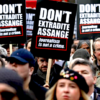
All the safeguards being setting up now to manipulate information online are not there to eliminate lies, they’re there to eliminate truth.
Elon Musk’s talk about free speech will only matter if and when Twitter stops censoring Russian media and people who question the official narrative about Ukraine.